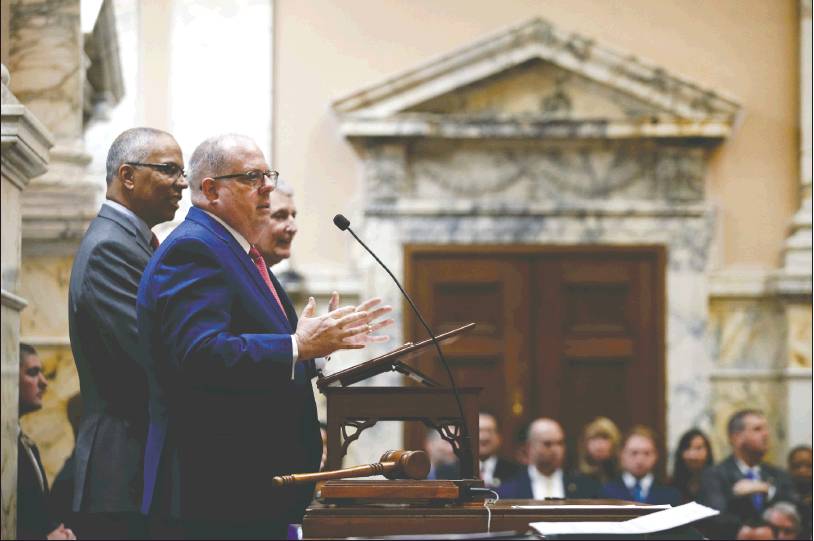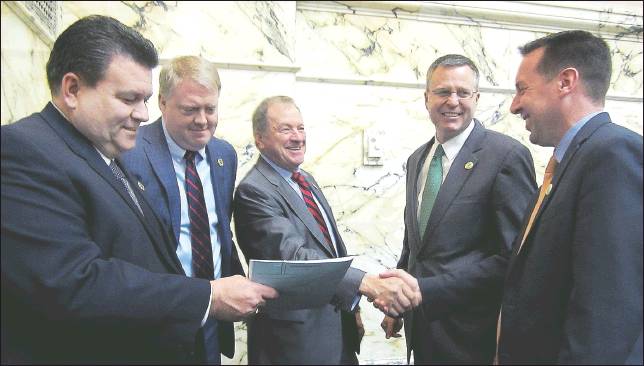Underway in Annapolis
Pleas for bipartisanship punctuate 2018 General Assembly opening day
By TAMELA BAKER tbaker@herald-mail.com
ANNAPOLIS — Official Maryland dressed up and celebrated the opening of the 2018 General Assembly on Wednesday, with a little fanfare, a lot of lobbying and more receptions than any single legislator could get to before the day was over.
Gov. Larry Hogan visited both the Senate and the House of Delegates, nodding to coming elections but encouraging legislators to abandon partisanship for the 90-day legislative session.
“Together … we really have accomplished many, many things for the people of Maryland,” he told the Senate, noting that he and Senate President Thomas V. Mike Miller Jr. “have been friends for many, many years.”
“I promise you that we’re going to do everything we can to put aside the politics for that 90 days,” Hogan told the House. “We have plenty of time for campaigning. Let’s try to spend the next 90 days talking to each other and coming up with compromises. And coming up with real, bipartisan common-sense solutions to the problems that face us.”
House Speaker Michael E. Bush also alluded to the election season, saying “I know there won’t be any posturing on any bills” as delegates chuckled.
But he said it’s “important for us to work together to solve problems, not create them.”
There “seemed to be a lot of bipartisanship,” said Del. William J. Wivell, R-Washington. “Let’s hope it holds for the next 89 days.”
A number of former legislators came back to visit, from former speaker and current U.S. Sen. Ben Cardin, D-Md., to Washington County Circuit Court Judge Brett Wilson. Busch recognized Wilson, calling him a “great legislator,” and introduced his successor in the House, former Hagerstown Councilman Paul D. Corder-man.
Corderman “comes from a family that has a pedigree in public service,” Busch said. “His father, John Corderman, was a senator here and also went on to become a judge in Hagerstown. So we want to welcome you to the Maryland House of Delegates.”
Busch also touched on health issues that plagued him during last year’s legislative session and culminated in a liver transplant during the summer, calling it a “life-changing experience.”
He “seemed to be in good spirits,” Wivell said. “Glad to see that his health has been restored.”
Del. Neil Parrott, R-Washington, noted that both Busch and Hogan, who was diagnosed with cancer early in his administration, had overcome life-threatening illness.
“It was impressive to hear about Speaker Busch’s medical challenges over the last year,” Parrott said. “I think they see life from a different perspective.”
He also said he was encouraged by overtures Hogan and Busch made toward each other in their opening day remarks.
Corderman cast his first vote Wednesday, voting with the rest of the House to sustain most of Hogan’s vetoes of bills passed during last year’s session.
But one of the last acts the House performed before adjourning Wednesday was to separate at least one out for further action, and that was Hogan’s veto of a bill to require businesses with 15 or more employees to provide paid sick leave. Businesses had vigorously opposed the bill, but the House will likely vote today to override the veto.
Del. Mike McKay, R-Washington, said he’d asked Busch on Wednesday morning “what was the best way for this not to become grandstanding … and he said, ‘Well, if we all just keep focused that we’re trying to solve the people of the state of Maryland’s issues … if we really, really stick to (the reason) why we’re down here is to represent those people back home.
“‘Because that’s what they want us to do, is to see some kind of results.’”
Online video www.heraldmailmedia.com

